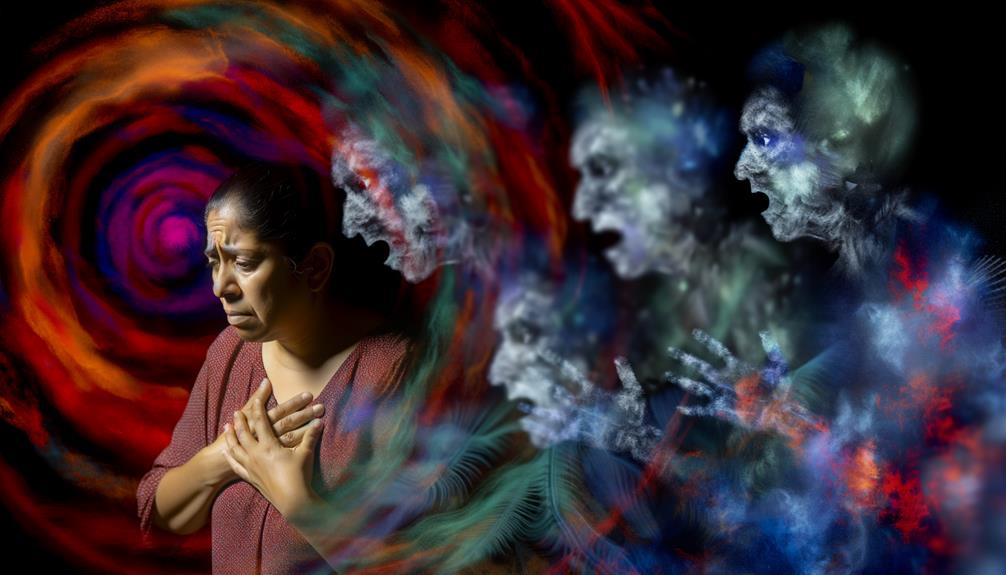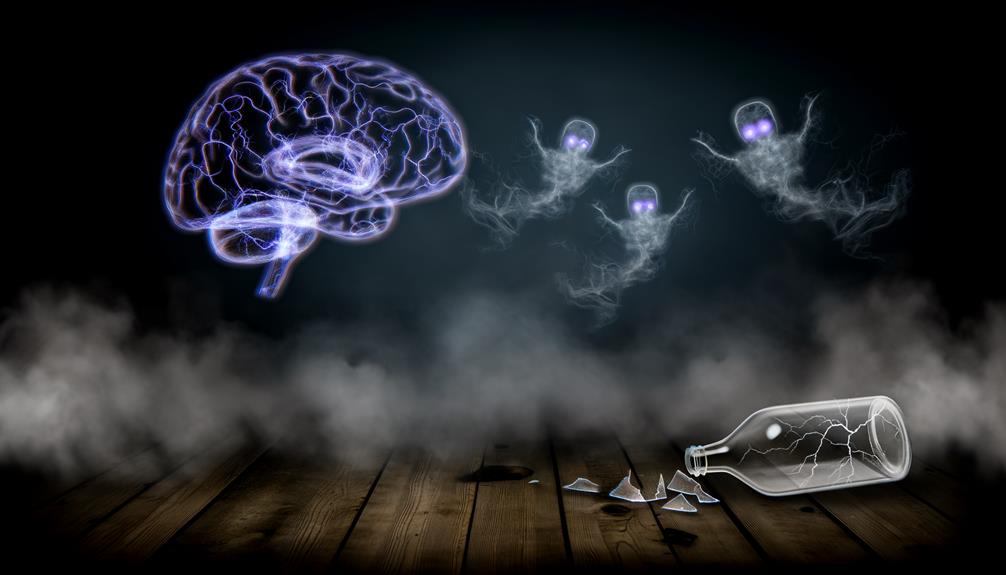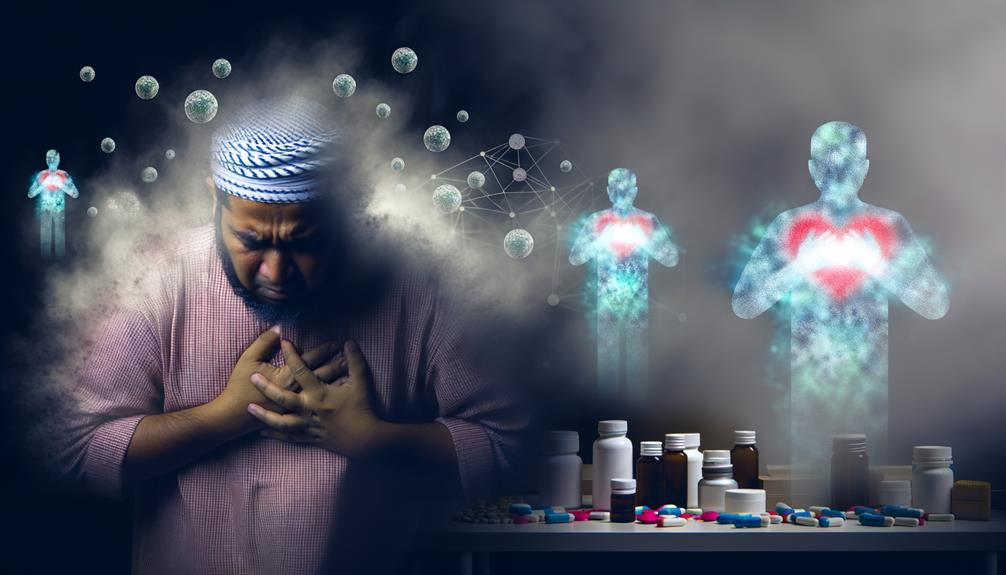You might be wondering if alcohol withdrawal can actually lead to panic attacks. It's a valid concern, especially given the significant changes your nervous system goes through during detox. As your body adapts to the absence of alcohol, you could experience anxiety, mood swings, and even insomnia, all of which can heighten the risk of panic episodes. With around 25% of people with panic disorders having a history of alcohol dependence, the connection is evident. But what exactly happens in your brain during this time, and why is professional supervision so essential? Let's explore further.
Contents
Understanding Panic Attacks
Imagine suddenly feeling like your heart is racing, your palms are sweaty, and you're struggling to catch your breath—these are hallmark signs of a panic attack. Panic attacks are characterized by abrupt episodes of intense fear or discomfort, accompanied by symptoms such as rapid heartbeat, sweating, and dizziness. These episodes peak within minutes and gradually subside, leaving a profound impact on those who experience them.
Individuals who experience recurrent panic attacks may develop panic disorder, a condition marked by a persistent fear of future attacks. This fear often exacerbates the anxiety surrounding the unpredictability of these episodes. The symptoms of panic attacks can closely mimic those of severe physical health issues, such as heart attacks, leading to further concern and distress. For some, the physical sensations experienced during a panic attack may be so intense that they fear losing control or dying.
Notably, there is a significant intersection between alcohol use and panic attacks. Approximately 25% of individuals seeking treatment for panic disorder report a history of alcohol dependence. This connection is critical, as alcohol withdrawal symptoms can exacerbate the frequency and severity of panic attacks. The withdrawal process itself can induce significant anxiety and panic symptoms, complicating the clinical picture and necessitating targeted treatment strategies.
Limited-symptom panic attacks, which involve fewer than four distress indicators, can still cause substantial anxiety and a fear of impending full-blown attacks. Recognizing and effectively treating panic and its associated symptoms, particularly in individuals with a history of alcohol use, is essential. Extensive treatment approaches often include cognitive-behavioral therapy (CBT) and pharmacological interventions, aimed at reducing the frequency and intensity of panic episodes while addressing underlying anxiety and substance use issues.
Anxiety During Detox

Alcohol withdrawal, a process that notably impacts the nervous system, often triggers pronounced anxiety symptoms, including panic attacks. When you undergo alcohol withdrawal, your body experiences a considerable physiological upheaval. This disruption can lead to severe anxiety symptoms, mood swings, depression, and insomnia. These conditions are not merely uncomfortable; they can greatly exacerbate the risk of panic attacks.
Approximately 25% of individuals with panic disorders have a history of alcohol dependence, underscoring a strong connection between panic attacks and substance use. The physical symptoms of alcohol withdrawal, such as headaches and nausea, can further intensify feelings of anxiety, thereby contributing to the occurrence of panic episodes. These symptoms collectively form a distressing withdrawal experience that necessitates structured intervention.
A medical detox program becomes vital in managing these intense anxiety symptoms effectively. During medical detox, healthcare professionals provide both pharmacological and psychological support to mitigate anxiety and prevent panic attacks. This structured environment guarantees that your withdrawal process is monitored and managed, greatly reducing the risk of severe anxiety-related complications.
Given the profound impact of alcohol withdrawal on mental health, it's imperative to seek professional guidance. Mental health professionals can offer tailored strategies to manage anxiety symptoms, including cognitive-behavioral techniques and, when necessary, medication. This integrated approach not only addresses the immediate symptoms but also supports long-term mental health stability.
Alcohol's Effects on the Brain

Alcohol's neurochemical impact considerably alters the brain's functioning, affecting neurotransmitters and serotonin levels. When you consume alcohol, it initially increases the level of serotonin, a neurotransmitter associated with mood regulation, which can create a temporary feeling of well-being and reduced anxiety. However, prolonged alcohol use disrupts this balance, leading your brain to adapt by adjusting neurotransmitter levels to counteract the depressant effects of alcohol.
As your brain tries to maintain homeostasis, it increases the production of stimulating chemicals. This adjustment means that when you stop drinking, the sudden absence of alcohol results in overstimulation. The neurotransmitter imbalance can lead to heightened anxiety and, in many cases, panic attacks. The brain's reliance on alcohol as a depressant turns it into a double-edged sword; while it may reduce anxiety initially, its withdrawal can cause a significant rebound effect.
During withdrawal, the abrupt shift in brain chemistry can exacerbate anxiety and trigger panic attacks. The overstimulation caused by increased levels of excitatory neurotransmitters, coupled with decreased serotonin, can lead to severe psychological distress. The symptoms can persist for several hours or even days after alcohol use, making the withdrawal period particularly challenging.
Understanding these neurochemical changes is vital for grasping why alcohol withdrawal can induce panic attacks. Your brain's adaptation to chronic alcohol use makes it more vulnerable to anxiety and panic when the depressant is suddenly removed. This neurochemical turmoil underscores the importance of medical supervision during alcohol withdrawal to manage anxiety and mitigate panic attacks effectively.
Withdrawal Symptoms

When you stop drinking after prolonged alcohol use, your body undergoes a cascade of withdrawal symptoms due to the sudden absence of the depressant. These withdrawal symptoms can manifest in various forms, including anxiety, tremors, and panic attacks, particularly if you have a history of alcohol dependence. The brain, having adapted to the continuous presence of alcohol, becomes overstimulated when it's suddenly removed, leading to a series of physiological and psychological responses.
One of the most distressing withdrawal symptoms is the onset of panic attacks. During alcohol withdrawal, panic attacks can span from a few days to several weeks, as your brain struggles to recalibrate its neurotransmitter balance. The prevalence of panic disorder among individuals with a history of alcohol dependence is significantly high, with approximately 25% experiencing both conditions. This correlation underscores the important interplay between chronic alcohol use and heightened anxiety levels during detox.
In addition to panic attacks, you may experience a range of other withdrawal symptoms such as insomnia and generalized anxiety. These manifestations occur as your body and brain adjust to the abrupt absence of alcohol. It's essential to recognize that severe withdrawal symptoms, including panic attacks, can be life-threatening. This danger often necessitates a medically supervised detox to guarantee your safety and provide appropriate management of these symptoms. A medically supervised detox can help mitigate the risks associated with severe withdrawal symptoms, offering you a safer pathway to recovery. Understanding the complexity and potential severity of alcohol withdrawal is vital in addressing and managing these symptoms effectively.
The Need for Supervised Detox

Recognizing the critical importance of professional monitoring, medically supervised detox becomes indispensable during alcohol withdrawal to prevent potentially life-threatening symptoms, including panic attacks. During withdrawal, the body undergoes significant physiological changes, often leading to severe symptoms. Panic attacks, characterized by sudden feelings of intense fear and physical discomfort, can persist for days to weeks, complicating the recovery process. This is primarily due to the brain's overstimulation after prolonged alcohol use.
Supervised detox programs offer a controlled environment where withdrawal symptoms are meticulously managed. Medical support is essential to monitor crucial signs and administer medications that can alleviate severe withdrawal symptoms. This proactive approach minimizes the risk of complications, ensuring a safer detoxification process.
Mental health maintenance is another essential aspect of supervised detox. Panic attacks during withdrawal can exacerbate underlying anxiety disorders or other co-occurring health issues. Psychological support, integrated into supervised detox programs, addresses these mental health challenges. Trained professionals provide counseling and therapeutic interventions to help you manage anxiety and other psychological symptoms effectively.
Furthermore, supervised detox programs are adept at identifying and managing co-occurring health issues that might arise during the withdrawal phase. These health issues, if left unchecked, can complicate the detox process and impede recovery. By providing thorough care that includes both medical and psychological support, supervised detox programs create a holistic approach to managing alcohol withdrawal.
Treatment and Support Options

Maneuvering the maze of alcohol withdrawal requires robust treatment and support options to address both physical and psychological symptoms. Alcohol detox programs are fundamental in providing thorough medical and psychological support to manage withdrawal symptoms, including panic attacks. These programs often employ psychiatric medications, such as benzodiazepines, to alleviate panic-related problems during the withdrawal process. This pharmacological approach is essential in stabilizing acute anxiety disorder manifestations commonly seen in withdrawal.
In addition to medication, psychotherapy plays a pivotal role in the treatment for panic disorder. Cognitive-behavioral therapy (CBT) is particularly effective in helping individuals understand and mitigate the cognitive distortions that contribute to panic and anxiety. Moreover, holistic approaches like yoga and meditation can complement traditional psychotherapy by promoting relaxation and stress reduction, addressing underlying anxiety issues that exacerbate panic symptoms.
Peer support groups are another invaluable resource during alcohol withdrawal. These groups provide a platform for sharing coping strategies and fostering a sense of community, which can greatly reduce feelings of isolation and helplessness. The camaraderie and mutual understanding found in peer support groups can be a powerful adjunct to formal treatment modalities.
Access to professional teams trained in anxiety and panic management is vital. These teams can offer personalized treatment plans tailored to the unique needs of each individual, ensuring a safe and effective detox experience. By integrating medical, psychological, and community-based support, individuals can navigate the complexities of withdrawal with a thorough approach that mitigates both withdrawal symptoms and panic-related problems.
Conclusion
You've now seen the critical connection between alcohol withdrawal and panic attacks. The significant neurological adjustments and neurotransmitter imbalances during detox can precipitate severe anxiety and panic episodes. With about 25% of individuals with panic disorders having a history of alcohol dependence, it's clear—supervised detox is vital. Proper professional oversight guarantees effective management of these distressing symptoms, providing a better path to recovery. Don't underestimate the importance of structured medical support.
